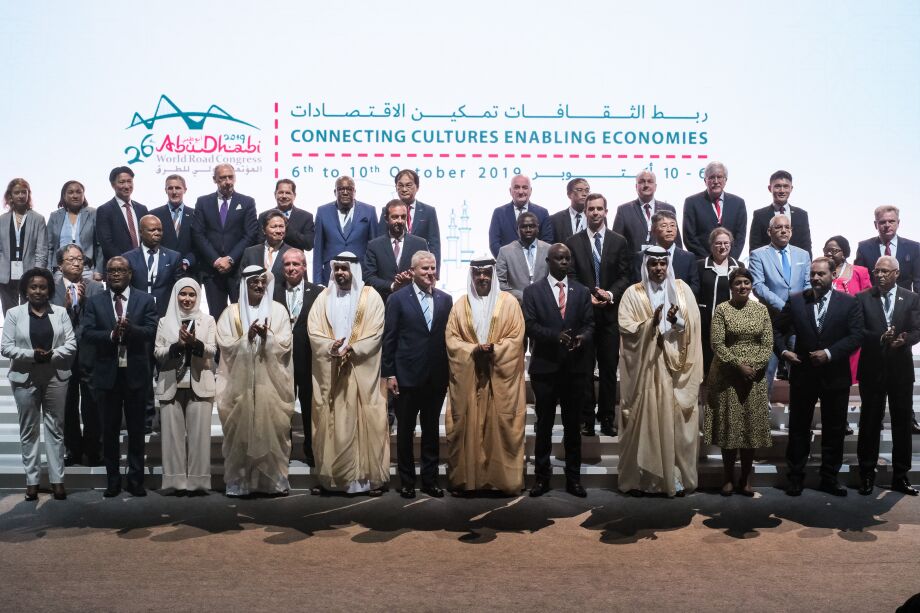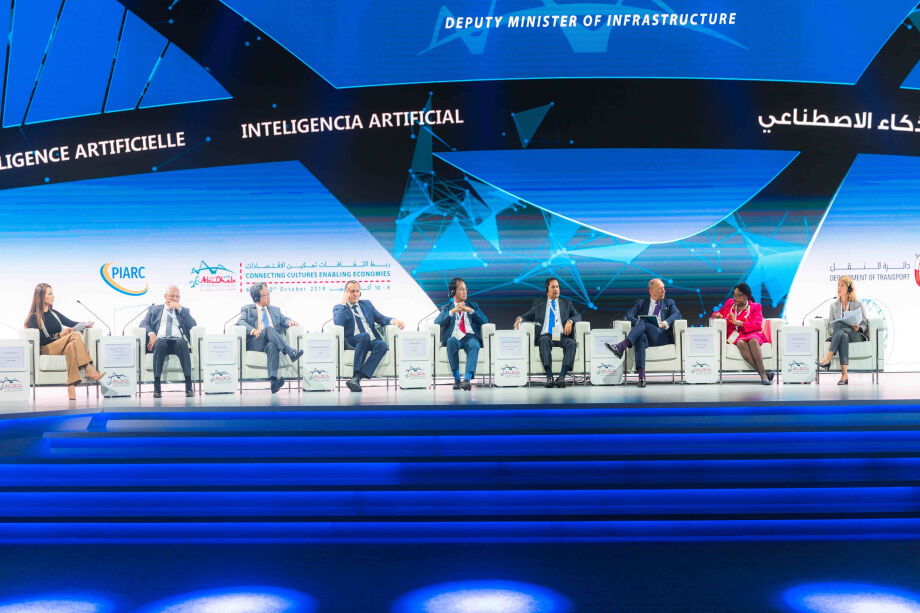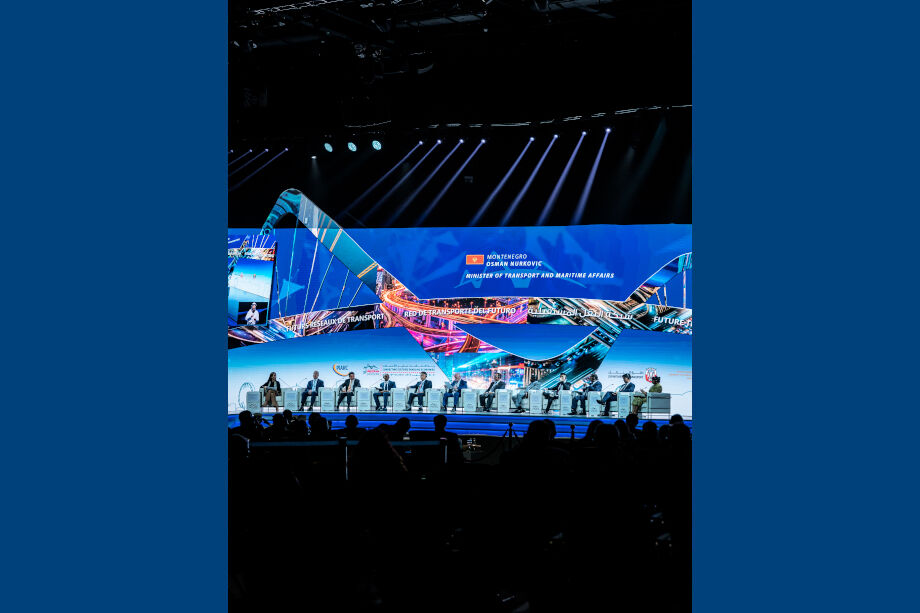Ministers' Session
Sunday 6 October afternoon - 11.00-17.00 hrs.
Theme: Evolution of road policies for future generations
Main lines
Beyond the traditional function of the road network, the road sector faces new challenges and imperatives related to social protection, climate change, road safety, resilience imperatives. It also has to meet the requirement for maximum use of existing infrastructure despite severe investment constraints, while new opportunities are offered by new technologies. It is necessary for road authorities to develop new policies to address this new environment for roads and road transport.
Ministers from around the world were invited to share their views and explain the current challenges facing their countries and the solutions they are implementing.
No less than 40 ministers and 3,000 participants attended these sessions chaired by UAE officials. They highlighted the importance of data for effective planning and the role of new technologies in improving transport services and achieving the objectives of the security strategy.
The session was structured in three round tables:
Transport network of the future
Connected technology and innovative transport services provide opportunities to change the way services are provided, linking cities and neighborhoods. A well-designed and efficient transport system contributes to economic growth and to improving the quality of life of inhabitants, becoming one of the key determinants of development.
Some key questions:
This session was opened by Claude Van Rooten, President of PIARC.
Speaking Ministers
- Australia, Michael McCormack, Deputy Premier and Minister of Infrastructure, Transportation and Regional Development
- Burma, Kyaw Linn, Deputy Minister of Construction
- Cambodia, Sun Chanthol, Minister of Public Works and Transportation
- Korea, Kee-Choo Choi, Deputy Minister of Land, Infrastructure and Transport
- Spain, José Luis Ábalos Meco, Minister of Development
- Equatorial Guinea, Rufino Ovono Ondo Engonga, Minister of Transport, Posts and Telecommunications
- Montenegro, Osman Nurković, Minister of Transport and Maritime Affairs
- United Kingdom, Nusrat Ghani, Minister of Accessibility and Skills
- Senegal, Oumar Youm, Minister of Infrastructures, Land Transport and Landlock
- Singapore, Baey Yam Keng, Parliamentary Secretary of the Ministry of Transport
- Sweden, Mattias Landgren, Secretary of State to the Minister for Infrastructure
Artificial intelligence (AI) in the road sector
The contribution of new technologies such as artificial intelligence has the capacity to improve road transport services and to achieve road safety strategy objectives. For example, AI can predict potential risks using information obtained from a variety of indoor and outdoor sensors, the vehicle's on-board computer and network, and a cloud-based service. AI can also contribute to the optimisation of transport services, among other things through the identification of demand and resource allocation patterns.
Some key questions :
- How do governments approach these new technologies and what should they consider?
- How do authorities determine whether to adopt such a new technology?
- What infrastructure changes are needed and how does a government modify the infrastructure to safely adapt to this new technology in a cost-effective and predictive manner?
- How does a country begin to regulate these new technologies?
This session was opened by Omar Bin Sultan Al Olama, Minister of
Artificial Intelligence (AI) of the United Arab Emirates.
Speaking Ministers
- South Africa, Dikeledi Magadzi, Deputy Minister of Transport
- Angola, Manuel Tavares de Almeida, Minister of Construction and Public Works
- Japan, Masafumi Mori, former Deputy Minister of Territory, Infrastructure, Transport and Tourism
- Lithuania, Jaroslav Narkevic, Minister of Transport and Communications
- Malaysia, YB Baru Bian, Minister of Works
- Nicaragua, Oscar Salvador Mojica, Minister of Transport and Infrastructure
- Serbia, Sasa Stojanovic, Deputy Minister for Transport, Roads and Road Safety
- Ukraine, Natalie Forsyuk, Assistant Minister of Infrastructure
Spatial planning
Planning correctly requires an understanding of the challenges and possible solutions, with a good understanding of the essential data for transport: the structure of daily business travel, traffic and public transport movements, necessary road works and major events that generate increased management and affect mobility.
Some key questions :
- What are the components of good infrastructure planning, such as environmental impact and optimal land use?
- How can governments reduce traffic through intelligent mobility?
- Should we seek to limit the need for long-distance travel?
- What are the key considerations for transport resilience and sustainability for the future?
- How can governments plan for future urban planning and transport needs?
This session was opened by Young Tae Kim, Secretary General of the
International Transport Forum (ITF).
Speaking Ministers
- Andorra, Jordi Torres Falcó, Minister for Spatial Planning
- Barbados, Peter Phillips, Minister for Transport Works and Maintenance
- Burundi, Jean Bosco Ntunzwenimana, Minister for Transport, Public Works, Infrastructure and Town and Country Planning
- Ethiopia, Hiwot Mosisa Deresa, Minister of State for Transport
- Mali, Ibrahima Abdoul LY, Minister of Transport and Urban Mobility
- Paraguay, Ignacio Gómez, Deputy Minister of Public Works
- Czech Republic, Tomáš Čoček, First Deputy Minister of Transport
- United Kingdom / Scotland, Michael Matheson, Secretary to the Cabinet for Transport, Infrastructure and Connectivity


